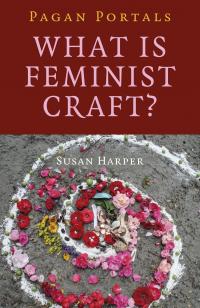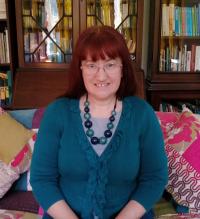
[caption id="attachment_5132" align="alignleft" width="300"] Huntress_Diana_by_Edward_McCartan By John Benson (Flickr Huntress) [CC BY 2.0 (httpcreativecommons.orglicensesby2.0)], via Wikimedia Commons[/caption]In Her most familiar
guise, the classical goddess Diana appears as the huntress. More often than not, She is portrayed as a lithe and athletic young woman, carrying her bow in one hand and accompanied by her hunting
dogs.
Huntress_Diana_by_Edward_McCartan By John Benson (Flickr Huntress) [CC BY 2.0 (httpcreativecommons.orglicensesby2.0)], via Wikimedia Commons[/caption]In Her most familiar
guise, the classical goddess Diana appears as the huntress. More often than not, She is portrayed as a lithe and athletic young woman, carrying her bow in one hand and accompanied by her hunting
dogs.
Yet in our modern age this is an aspect of the Goddess that is rarely recognised, let alone being one with whom most of us feel comfortable. There is certainly, at least to some extent, an element of queasiness about the whole issue of the hunt, born of modern sensitivities. Such sensitivities are not wrong, for the character of hunting, in European societies at least, has fundamentally changed in the last few centuries, but those sensitivities should not be allowed to colour our understanding of other times and cultures, or our understanding of the context that informs a myth.
The archetype of the Goddess-as-huntress arises from an age when the hunt was an absolute necessity for the survival of the community. And the skills of the hunt were themselves considered to be a form of magical power (like that of the blacksmith) that had an intrinsic value. Accounts of hunting in "traditional cultures" tend to emphasise the close relationship, even bond, between the hunter and the prey, the remarkable closeness of the hunter to the natural environment, closeness to a degree that raises the path of the hunt to the status of a spiritual path in itself.
Somehow, the awareness of this side of our relationship with Nature has been distorted beyond recognition. A part of the responsibility for this, at least, lies with the influence of some New Age ideas that have emphasised a false and imbalanced focus on Light, at the expense of the other side of the spiritual equation. We all need to find our own point of balance, between the Light and the Dark, between positive and negative poles, between the "masculine" and "feminine" aspects of ourselves; between the consciousness of the hunter and the consciousness of the hunted within each and every one of us.
The Goddesses of darkness, whether Diana-as-huntress, Kali or Morrigan (and, of course, their male consorts), have a vital place in the scheme of totality, a place that we disregard at our peril. For those aspects of Nature, be it our own inner nature or that which is all around us, that we ignore or repress tend to break into our attention in other, and often dramatic or even terrible ways. It is unsurprising, for example, that the Roman Catholic priesthood, regarding sexuality as a sinful (i.e. "dark") force and insisting on celibacy, has such an appalling record of sexual exploitation and abuse. The same kind of consequence can result from the repression of our own Darkness.
To reiterate - Dark should not be equated with "evil". War Goddesses such as the Morrigan and Cathubodva hold court over the battlefield as naturally as a lioness must hunt in order to bring food to her cubs. They are simply what they are. Just as death is necessarily an integral part of life, and as life is so often sustained by death.
Diana is not often regarded specifically as one of these Dark Goddesses. But Her role as the huntress carries much the same charge. Because of this, the image of Diana the Huntress can help us to perceive our fiercer instincts in a more positive form than is usually encouraged. For Diana, the hunt is a maternal action. She is the protector of the family of Her devotees, and of Her spiritual heritage, and the protection that She offers may be swift and ruthless; and so all the more effective.
The role of goddess-as-huntress highlights, too, the core value of balance within our attitudes to the Land. In terms of our outward actions, we need to be prepared and able not only to nurture our natural environment, but to defend and protect that environment in practical and effective ways. In our own selves, we need to grow a capacity to be our own guardians, to protect, with the proud and just ferocity of the huntress, whatever is essential to our own humanity, whatever is essential to our own individual being and spiritual wholeness.
The process begins within. Unless we can learn to be assertive in our own right, unless we can become the protectors of our own Inner nature, we cannot fully act as the guardians of the Land in its outward manifestations.
Much has been made, over recent years, of the phenomenon of the "eco-warrior". The term itself raises some interesting and relevant issues. Crucial to the genuine warrior path, in all cultures and historical periods, has been the central awareness that the warrior's foremost and essential battle is always internal, demanding an intense focus upon one's own inner personal development.
I feel that there is an important lesson to be learned from this. That if we truly wish to become the guardians of our natural heritage and birthright - to become, in effect, the warriors of the Land - then our training must be more profound than a training in the forms and the techniques of civil disobedience. We have to look in, as well as out, through the window of the soul.
Warriors, hunters...the images of these, the archetypes that still haunt us, have been demeaned and disfigured. They have become badly confused, now, with the more recently constructed picture of the mechanically obedient soldier, or with the leisured brutality of the ruling class. In the course of becoming fully human (in terms of fulfilling our genuine spiritual potential), in the course of recovering our sense of integration within the Land, we will need to regain the original meaning of the archetypes.
Categories:
0 comments on this article






